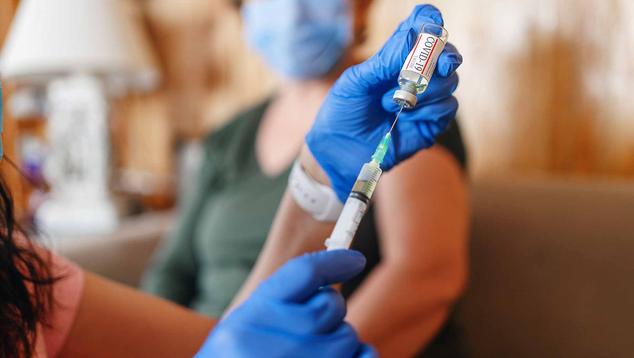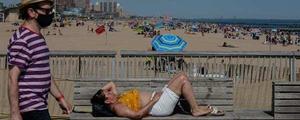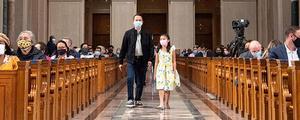Story Highlights
- In U.S., 64% vaccinated, 12% plan to be
- 78% of those not planning to get vaccinated are unlikely to change their mind
WASHINGTON, D.C.-- Seventy-six percent of U.S. adults say they have been vaccinated against COVID-19 or plan to be, a number that has been stable over the past three months but is higher than in late 2020 and early 2021.

Line graph. Seventy-six percent of U.S. adults in May 2021 have been vaccinated against COVID-19 or plan to be, similar to the 75% and 74% measured in April and March, respectively. When Gallup first asked the question in July 2020, 65% planned to get vaccinated, which dropped to 50% in September before recovering by December.
As of the May 18-23 survey, 60% of U.S. adults report they have been fully vaccinated against COVID-19, 4% have been partially vaccinated, 12% plan to be vaccinated and 24% do not plan to be vaccinated.
Among those not planning to be vaccinated, 78% say they are unlikely to reconsider their plans, including 51% who say they are "not likely at all" to change their mind and get vaccinated. That leaves one in five vaccine-reluctant adults open to reconsidering, with 2% saying they are very likely and 19% saying they are somewhat likely to change their mind and get vaccinated -- equivalent to 5% of all U.S. adults.
Last week, the Biden administration announced plans to increase efforts to achieve its goal of having 70% of adults at least partially vaccinated by the Fourth of July holiday. With 64% already vaccinated, that goal seems within reach if half of the 12% planning to get vaccinated follow through, even if none of those not planning to get vaccinated change their mind. The administration's efforts include outreach to citizens, offers of free childcare, and incentives such as free air travel and free sports tickets.
States are also trying creative approaches to encourage those who are reluctant to get vaccinated, including offering lottery prizes of varying amounts, savings bonds, free amusement park tickets and free hunting and fishing licenses.
The brewer Anheuser-Busch is offering Americans free beer if the nation meets Biden's goal.
Gallup's data suggest the ceiling on vaccination could be about 80% of U.S. adults. That would include the 76% who are already vaccinated or plan to be plus the 5% who do not plan to get vaccinated but say they are at least somewhat likely to change their mind.
A steady 53% of U.S. adults say they are worried about people choosing not to get vaccinated, including 25% who are very worried. It is now the public's greatest worry about the virus by a wide margin, surpassing concerns about lack of social distancing in their area (27%), availability of local hospital resources and supplies (11%), and availability of coronavirus tests in their area (5%),
Reasons for Not Getting Vaccinated Vary
Gallup's March and April COVID-19 surveys found no dominant reason among vaccine-reluctant individuals for their intention not to get vaccinated. The most common reasons given were wanting to confirm the vaccine was safe (23%) and a belief they would not get seriously ill from the virus (20%). Slightly fewer expressed concerns about the timeline for developing the vaccine (16%) or mistrust of vaccines in general (16%). Ten percent said they already have immunity because they have had COVID-19, while 10% cite allergies or concern about allergies as the reason they do not plan to get vaccinated.
The one in four vaccine-reluctant adults are not distributed equally across major demographic groups:
-
About half of Republicans, 46%, compared with 31% of independents and 6% of Democrats, do not plan to get the COVID-19 vaccine.
-
Americans without a college degree are much more likely than college graduates to be vaccine-hesitant, 31% to 12%.
-
Vaccine hesitancy is more common among middle-aged Americans (33% of those between the ages of 35 and 54) than among younger (22%) and older Americans (20%).
Bottom Line
Widespread COVID-19 vaccination has undoubtedly been a major reason behind the steep decline in infections and deaths from the disease in the U.S. in recent months. The rate of vaccinations has slowed down considerably in recent weeks, now that most Americans who wanted to get vaccinated have done so. Further increasing the proportion of vaccinated adults in the population will be a challenge, as the remaining vaccine-willing population may be less eager to get their shots. They may also face practical or logistical challenges to getting vaccinated, something vaccine administrators are attempting to overcome by offering walk-in appointments at pharmacies and health centers, on-site vaccination for employees at work sites, travelers at airports, and in churches. Incentives may also encourage those who are less motivated to get the vaccine to do so.
However, these efforts seem unlikely to convince the nearly one in five Americans who do not plan to get vaccinated and say they are unlikely to change their mind. Still, having somewhere between 65% and 80% of the public vaccinated, in addition to the unvaccinated Americans who have had and recovered from COVID-19, may be enough to ensure that Americans can largely return to their pre-pandemic lives without fear of getting sick or contributing to further spread of the disease.
Learn more about how the Gallup Panel works.



